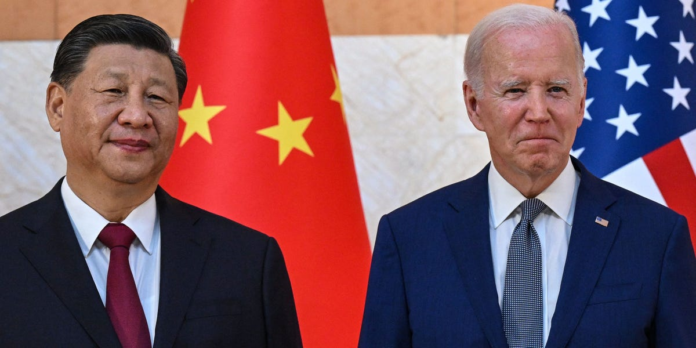The fate of the global economy may depend on TSMC, the Taiwan-based chipmaker.
The company announced last week it was investing $40 billion in two Arizona factories.
Experts disagree on how much this will protect the US economy in the event of a Chinese invasion of Taiwan.
Sign up for our newsletter to get the inside scoop on what traders are talking about — delivered daily to your inbox. Loading Something is loading. Thanks for signing up! Access your favorite topics in a personalized feed while you’re on the go. download the app Email address By clicking ‘Sign up’, you agree to receive marketing emails from Insider as well as other partner offers and accept our Terms of Service and Privacy Policy
The US could face a recession next year, but a Chinese invasion of Taiwan might pose a far greater economic threat.
President Joe Biden has been touting moves to secure the US’s vulnerable electronics supply chains, but many experts say they’re not enough.
Last week, Taiwan Semiconductor Manufacturing, the world’s biggest chipmaker, announced it would be opening a second factory in Arizona, increasing the company’s investment in the state from $12 billion to $40 billion.
TSMC expects the two factories, which are scheduled to be completed in 2024 and 2026, to annually produce over 600,000 wafers — thin slices of semiconductor material — by 2026.
In a speech at a TSMC facility in Phoenix, Biden said the investment could be a “game changer.”
“These investments are helping us build and strengthen the supply chain here in America,” Biden said, adding that “American manufacturing is back.”
The US has taken steps to increase domestic chip production because the country is reliant on TSMC’s Taiwan factories for the manufacturing of products that include cars, PCs, iPhones, and washing machines. The company accounts for over half of the global semiconductor market, producing most of the world’s roughly 1.4 billion smartphone processors and about 60% of the chips used by automakers.
In the event China — which claims the island as its own — invades the island and chip production screeches to a halt, there could be trillions of dollars in economic losses.
“If China would invade Taiwan, that would be the biggest impact we’ve seen to the global economy — possibly ever,” Glenn O’Donnell, the vice president and research director at Forrester, previously told Insider. “This could be bigger than 1929.”
And many experts say it’s just a matter of time before an invasion happens, whether it’s by 2030, 2025, or even by the end of next year.
The Arizona investment is unlikely to protect the US economy
While the Arizona factories are undoubtedly a step in the right direction for the US as it seeks to reduce its dependence on Taiwan, experts disagree on just how impactful they will be when production begins.
Administration advisors have argued they could fully secure the country’s chip supply.
“At scale, these two factories could meet the entire US demand for US chips when they’re completed,” Ronnie Chatterji, the National Economic Council acting deputy director for industrial policy, told CNBC. “That’s the definition of supply chain resilience. We won’t have to rely on anyone else to make the chips we need.”
But Dylan Patel, a chief analyst at the semiconductor research and consulting firm SemiAnalysis, disagrees. Given TSMC on the whole produced over 14 million wafers last year, and US companies accounted for nearly two-thirds of the company’s total revenue, 600,000 wafers per year would be “nowhere close to the US demand,” he told Insider.
“It’s physically impossible for that fab to satisfy the US’s needs,” he said.
Even if production was higher, this wouldn’t necessarily erase the reliance on overseas supply chains either.
“Additional fab plants are important, but keep in mind that they depend on raw materials, including polysilicon, where the US is not self-sufficient,” William Alan Reinsch, a senior advisor at the Center for Strategic and International Studies, a national security think tank, told Insider. “Ultimately, creating a more resilient supply chain for semiconductors involves more than fab plants.”
The bottom line: Despite being the largest foreign direct investment in US history, the Arizona plants are unlikely to protect the US economy from the risk of a Chinese invasion of Taiwan.
“The new fabs won’t do much in the way of reducing the economic risk of a Taiwan contingency,” Martijn Rasser, a former CIA officer who is now a security and technology expert at the Center for a New American Security, told Insider. “All of TSMC’s most advanced capabilities, vital knowhow, and the bulk of its fabrication capacity remain on the island.”
To truly achieve supply chain resilience, Rasser says, the US must only boost production further, but needs similar investments in all areas of the chips supply chain, from raw materials to packaging.
Reinsch says “nobody” he’s spoke with thinks total self-sufficiency in this industry is possible, “so the challenge is to increase our capability while recognizing the inherent limitations on our ability to do that.”



